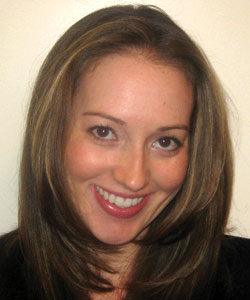Tessa West
 New York University
New York University
What does your research focus on?
My research primarily examines the dynamics that unfold during dyadic interactions, with a particular focus on the intergroup (e.g., cross-race) context. I study how individuals come to make sense of their partners’ behaviors, whether the inferences they make based on these behaviors are accurate, and how psychologists can shape such inferences to improve the quality of intergroup relationships. I also study basic person perception processes, and my theoretical work focuses on developing a unified approach to defining and studying accuracy in interpersonal perception.
What drew you to this line of research and why is it exciting to you?
I started studying interracial interactions during my undergraduate years at University of California (UC), Santa Barbara, and as I learned more about interpersonal perception, I became fascinated with the idea that it is possible to shape relationship outcomes by shaping what people believe about their partners’ behaviors, thoughts, and feelings, above and beyond the veracity of such beliefs. For example, I have examined questions such as, does the belief that one’s partner is similar to oneself matter more than actual similarity? I think focusing on the process of interpersonal perception provides many opportunities to develop new methods of improving interracial encounters, and in many social contexts.
Who were/are your mentors or scientific influences?
I have been incredibly lucky throughout my academic career by having such great mentors. As an undergraduate at UC Santa Barbara, I worked with Jim Blascovich, who gave me invaluable advice so early on in my career. I also worked with Wendy Mendes, Max Weisbuch, and Mark Seery, all of whom were graduate students at the time. These three individuals went out of their way to help train me and teach me how to be a social psychologist. I also worked with Nalini Ambady, who truly shaped my interests in person perception and intergroup relations. My graduate/post graduate mentors include David Kenny —who was as good as it gets as far as graduate advisors go — Jack Dovidio, Nicole Shelton, and Lou Penner. These individuals put so much effort into working with me, I will always be grateful. All of these people have also been scientific influences.
What’s your future research agenda?
I plan to continue to study interpersonal perception and behavior within the intergroup domain, but expand to new social contexts, such as the physician-patient context. In this line of work, I will focus on improving health outcomes for racial/ethnic minorities by targeting the process of communication during interactions with physicians. I also plan to extend my research on dyadic processes to examine the extent to which co-variation between two partners’ physiological states maps onto person perception processes. Lastly, in a very different vein, my ongoing and future research includes the study of how political ideology influences person perception, addressing questions such as whether conservatives or liberals are more accurate in perceiving others, and under what conditions.
What publication are you most proud of?
West, T. V., & Kenny, D. A. (2011). The truth and bias model of judgment (T&B). Psychological Review, 118, 357–378.
The article was winner of the 2012 Society for Personality and Social Psychology’s Theoretical Innovation Prize.





APS regularly opens certain online articles for discussion on our website. Effective February 2021, you must be a logged-in APS member to post comments. By posting a comment, you agree to our Community Guidelines and the display of your profile information, including your name and affiliation. Any opinions, findings, conclusions, or recommendations present in article comments are those of the writers and do not necessarily reflect the views of APS or the article’s author. For more information, please see our Community Guidelines.
Please login with your APS account to comment.